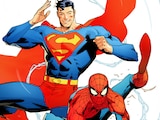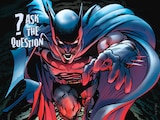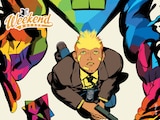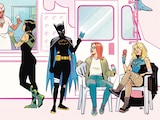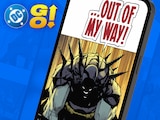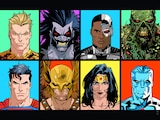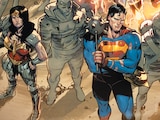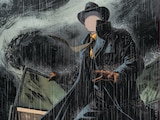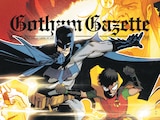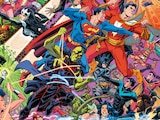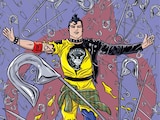When I look at the legacy of Superman stories, it is a challenge to not include Grant Morrison and Frank Quitely’s ALL-STAR SUPERMAN among the greatest tales ever told about the Man of Steel. It’s an epic examination of a character who has always been larger than life and deserves nothing less than to be celebrated as such. Each issue, from the first to the emotional last resonates in powerful ways, defining yet another aspect of the world’s first superhero. And yet, to my mind, none of them do it quite as well as ALL-STAR SUPERMAN #6. More than any other Superman comic that I’ve come across, it perfectly encapsulates what has resonated across the better part of a century about the Last Son of Krypton.
Comic book fans always want to draw comparisons between Batman and Superman. As the two soaring male giants of the DC Universe, it’s difficult to not want to try to compare them, despite the core concepts that set these two superheroes apart. I’ve always believed that when it comes to Batman, it’s the Dark Knight that’s the true identity and Bruce Wayne is the mask that he hides behind for the integrity of his crusade. But with Superman, Clark Kent is the real man. Clark Kent, immigrant child of Jonathan and Martha Kent is who he is. Superman is what he does.
For me, this side of the dichotomy is fascinating. This is where the sense of hope that defines Superman comes from. He lives his truth whether or not he is working for The Daily Planet or tilling a field, and he chooses to channel that truth for a higher cause. There is such nobility and such grace in this from a character who could have enslaved our entire planet, had he been so inclined.

All-Star Superman #6 distills this side of Superman so succinctly. Fans of the original Christopher Reeve Superman movie are familiar with a continuity where Pa Kent dies from a heart attack. This same tragedy is the cornerstone of All-Star Superman #6. While Clark is off being Superman and fighting the types of adversaries that only he can take on (and that only Morrison can dream up, like Klyzyzk Klzntplkz, the Superman of the 5th Dimension), Jonathan has a heart attack. Superman’s opponents, all of whom are crazy reflections of Superman himself, literally get in the Man of Steel’s way and keep him from being able to race to his father’s side in time to save him. The symbolism is pretty clear, as is what it says about the nature of comic book heroism. Superman gets in his own way as he battles representations of his superhero identity, and Clark Kent’s reality suffers inextricably for it.
There is even a panel with a single word balloon from Superman that reads: “I can save everybody!” in a moment that, as a reader, you know is not true.

In spite of his Kryptonian abilities and despite all of the tremendous superheroic feats that he is capable of, Clark Kent is incapable of preventing the death of his father. All-Star Superman #6 even poses the question of what could Superman have done for his father had he been able to reach him in time? What good is leaping tall buildings in a single bound or being faster than a speeding bullet against a breakdown on a cellular level? In the end, Superman still loses out to the natural order of things and Clark Kent is left grieving at his father’s tombstone.
Sure, there’s a big punchy fight right in the middle of the issue, but the emotional core that runs underneath All-Star Superman #6 is the most deeply human truth to our shared experience. The death of our parents is something that we all know is coming (and I write this as a person who had a parent pass away in my adolescence), yet can never prepare for. Pitting Superman against the inevitable reminds us that in spite of his powers and place of origin, he is still a man. It’s both a powerful reminder, and something so very small, sweet and harrowing.
Superman’s powerset has always been a challenge to writers. He’s invulnerable, beyond strong, faster than a speeding bullet, can see through walls and can fly. Who are you going to have him fight? (It’s funny that for a planet that was supposedly destroyed, there are an awful lot of Kryptonians still flying around the universe.) Writers typically have Superman face bigger and more powerful threats. Brainiac. Doomsday. Darkseid. Yet here he is defeated by the microscopic. Superman is taken down by an absolute scientific fact: children outlive their parents.

Coupled with the strength of the narrative and metanarrative built around this battle that Superman can’t win is some truly remarkable art. All-Star Superman #6’s color palate notably shifts depending on the emotional tone of the scene in question. At the start, as Clark reflects on his coming to Earth and being adopted by the Kents, it is dark, but soft. When Superman is out with Krypto and doing his superhero thing, it is bright and light. Later, after Clark learns of his father’s passing, it is dark and muted.
We have to give some real credit to a member of the All-Star Superman creative team who rarely gets discussed: colorist Jamie Grant. His work pairs perfectly with Quitely’s art, helping oh so much to achieve the mood the team is trying to create, almost to the point where it appears effortless. Meanwhile, Quitely’s pencils manage to carry both a contemporary and Silver Age sensibility to them. The art of All-Star Superman #6 feels perfectly out of time. In this way, and with the strength of the narrative, it is an issue that will always feel modern and will always resonate with the reader.
Even if you have never read an issue of Superman and never plan to read another one in your life, I cannot encourage you enough to pick up All-Star Superman #6. For my money, these 20+ page so perfectly encapsulate everything that the world’s first superhero should, and does, represent.

Ashley V. Robinson writes about DC Super Hero Girls and the DC Universe for DCComics.com and covers The Flash for the #DCTV Couch Club. Follow her on Twitter at @AshleyVRobinson.
ALL-STAR SUPERMAN #6 is available individually as a digital download, or in print as part of the ALL-STAR SUPERMAN trade collection.
ACTION COMICS #1000 featuring art and stories by Brian Michael Bendis, John Cassaday, Paul Dini, Geoff Johns, Tom King, Jim Lee, Scott Snyder and more is in stores this Wednesday.



